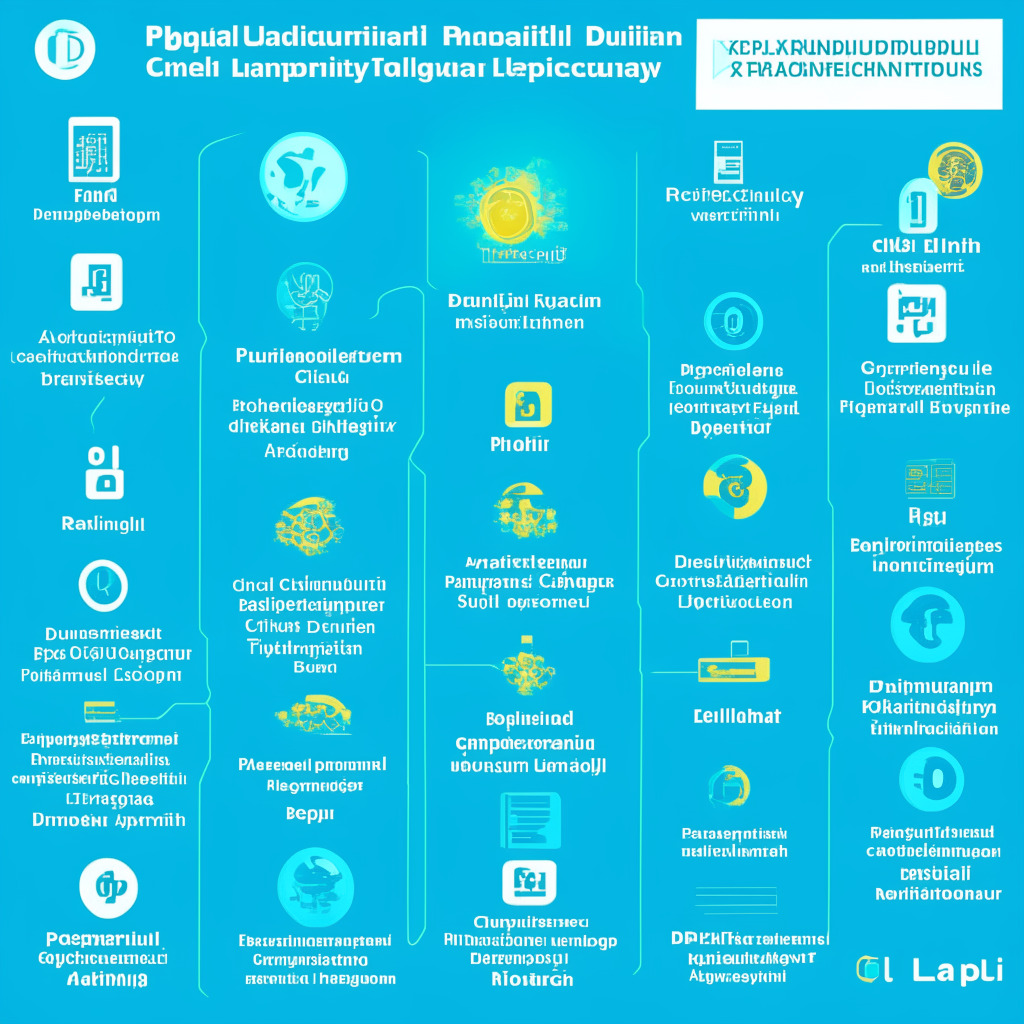Litecoin (LTC) has surged 15% within seven days, reaching a one-month high of $95. The price rally places LTC as the second-best performing digital asset with a market cap of over $1 billion. The increase may be due to congestion on the Bitcoin network, prompting traders to seek cheaper alternatives like Litecoin.
Month: May 2023
Balancing AI Advancements with Blockchain for Ethical Future
Blockchain technology offers transparency, traceability, and trust, which could offset some opaqueness associated with AI. Integrating blockchain may enhance transparency in AI models and ensure responsible AI governance standards, providing accountability and promoting ethical practices amid growing concerns about AI’s societal impact.
Ripple CBDC Platform: Revolutionizing Central Bank Digital Currencies or Risking Control?
Ripple is launching a unique platform for central bank digital currencies (CBDCs), empowering governments and financial institutions to design and develop digital currencies with ease. Leveraging Ripple’s Private Ledger, the platform enables instant settlement for domestic and cross-border payments, improving user experience in transactions.
Dogecoin’s Price Surge: Understanding the Golden Cross, NFTs, and Future Predictions
Dogecoin (DOGE) price has risen by 2% in the past 24 hours amid increased demand and all-time high transactions on its blockchain, largely driven by new DRC-20 tokens. The ‘golden cross’ indicator suggests a possible breakout for DOGE, while its potential as a more useful vehicle for NFT minting than Bitcoin could further bolster its price.
From Crypto Trader to Art Sensation: Trevor Jones’ Blockchain Innovations in Art World
Trevor Jones, one of the top 10 most successful crypto artists globally, began his journey in 2017 with Bitcoin investment. Turning to crypto painting in 2018, Jones held a crypto-themed exhibition, later venturing into non-fungible tokens (NFTs) and breaking sales records on SuperRare. His innovative blend of painting and blockchain technology has paved the way for success in the digital realm.
Record-Breaking $15M Bug Bounty: LayerZero Outshines MakerDAO in Quest for Security
LayerZero Labs announces a record-breaking $15 million bug bounty program in collaboration with crypto-focused bug bounty platform Immunefi. This initiative aims to incentivize white hat hackers to identify vulnerabilities in the LayerZero protocol, prioritizing security, and setting a positive example for the crypto industry.
Crypto.com Upgrades Payment Services: Enhanced User Experience or Complication?
Crypto.com announces an upgrade to its payment services, adding new features and support for more cryptocurrencies to improve user experience. The platform integrated a DeFi Wallet into Crypto.com Pay and now supports MATIC, USDC, and DAI, expanding its reach globally.
Pakistan’s Crypto Dilemma: FATF Compliance vs Economic Benefits & Financial Inclusion
Pakistan Finance Minister Aisha Ghaus’ decision not to legalize crypto trading is influenced by the Financial Action Task Force (FATF) and Pakistan’s recent removal from its “grey list.” Concerns about financial terrorism and appeasing the FATF outweigh potential economic benefits of embracing crypto technology. Despite this, Pakistan sees a growing adoption fueled by high inflation and unbanked citizens.
Crypto.com Upgrades Payment Services: Boost for Adoption or Lingering Security Concerns?
Crypto.com announces upgraded payment services, introducing new features and support for additional cryptocurrencies, enhancing user experience. Expansion allows customers in Asia, Europe, Latin America, and Australia to conveniently purchase cryptos like MATIC, USDC, and DAI using credit or debit cards within the DeFi Wallet app.
ApeCoin Improvement Proposal AIP-209: Boosting NFT Ecosystem or Risky Venture?
ApeCoin Improvement Proposal (AIP-209) approval aims to incubate and launch community-driven projects, bolstering the ApeCoin and Bored Ape Yacht Club (BAYC) ecosystems. The Ape Accelerator initiative boosts investor confidence and could potentially increase APE token prices amidst market volatility.
Visa Tackles Ethereum Account Abstraction & ERC-4337: Revolutionizing Crypto Payments
Visa explores Ethereum Account Abstraction and ERC-4337 for secure automatic recurring payments and potential gas fee redesigns. This aims to improve user convenience and enable seamless digital transactions in crypto onboarding experiences. Ethereum co-founder, Vitalik Buterin, supports these innovations for self-custodial wallets.
RNDR’s Surge and Apple’s VR Headset Entry: Analyzing the Altcoin’s Future Prospects
RNDR price surges 20% in 24 hours due to Apple’s upcoming VR headset announcement on June 5. Render’s decentralized GPU network appeals to VR and metaverse applications, driving increased adoption and potentially resulting in sustained value appreciation for this altcoin.
Crypto Surge Amid US Debt-Ceiling Optimism and CBDC Developments: Analyzing the Impact
Bitcoin experiences a 3% increase amid optimism surrounding a potential US debt-ceiling deal and rallying equity markets. Ripple develops a CBDC platform enabling institutions to issue digital currencies. Meanwhile, the Bitcoin Frogs NFT collection gains traction as the most traded within 24 hours.
Chainlink and Coinbase Cloud: Strengthening Network or Compromising Decentralization?
Chainlink announces partnership with Coinbase Cloud to strengthen its oracle network’s capacity and security as a node operator. While this collaboration may raise centralization concerns, it also offers the benefits of experienced companies with robust infrastructure, ensuring network reliability and high security standards.
Cross-Chain Innovations: Boosting Collaboration vs. Threatening Decentralization
Miami-based Borderless Capital leads a $50 million fund for fostering cross-chain innovations, addressing challenges in the Web3 landscape. Powered by Wormhole, a decentralized message-passing protocol, the fund aims to ease constraints for developers and promote inter-blockchain communication.
Coinbase Cloud Joins Chainlink as Node Operator: Boosting Decentralization and Smart Contract Security
Coinbase Cloud announces a partnership with blockchain oracle network Chainlink, operating as a node operator to improve decentralization and smart contract reliability. By leveraging its global infrastructure and blockchain data expertise, Coinbase Cloud aims to enhance Chainlink network’s security and reliability, connecting smart contracts to data and systems.
Ledger’s Recovery Service: Balancing Convenience and Security in Crypto Wallet Backups
Ledger introduces a new wallet recovery service, but faces mixed reactions from the crypto community due to concerns over privacy and security. The optional recovery service backs up users’ seed recovery phrases by encrypting and splitting them among third parties, aiming to prevent irreversible asset loss. However, some users fear it increases vulnerability.
Stable Bitcoin Amid US Debt Crisis: Tether Influence and USD’s Impact on Crypto Market
Bitcoin experiences a modest 1.5% gain as market sentiment gets a boost following President Biden’s confidence in resolving the US debt crisis. Tether’s commitment to purchasing Bitcoin may contribute to recovery, but the strengthening greenback and bearish outlook may provide hurdles.
Binance Australia Loses PayID Access: What It Means for Users and the Future of Crypto Exchanges
Binance’s Australian branch has lost its PayID deposit service due to a decision by its third-party payment provider, reportedly Cuscal. This affects bank transfer withdrawals and comes after the Australian Securities and Investments Commission canceled Binance’s derivatives license. The exchange is facing investigations by multiple U.S. government agencies.
Rise and Fall of PUNK ETF: Metaverse Potential vs Ethical Concerns
The Subversive Metaverse ETF (PUNK), launched to oppose Meta’s metaverse strategy, is shutting down after a 30% loss over 15 months. As skepticism about the metaverse grows, the importance of balancing innovation with ethical practices and scrutinizing key industry players’ motives is highlighted.
ApeCoin’s Accelerator: DAO Approved Launchpad for a Thriving Ecosystem or Just Hype?
The ApeCoin DAO community approved AIP-209, launching an Accelerator to support the incubation of projects using ApeCoin tokens. Aiming to strengthen the ApeCoin ecosystem, Ape Accelerator involves the community as initiators, voters, and participants, focusing on projects to improve the value of the Bored Ape Yacht Club NFT collection and other ApeCoin-utilizing initiatives.
Ripple CBDC Platform: Revolutionizing Digital Currencies or Leaving Some Behind?
Ripple unveils the Ripple CBDC Platform, an end-to-end solution for issuing central bank digital currencies (CBDCs). Aimed at enhancing financial inclusion and minimizing risk, the platform leverages XRP Ledger’s blockchain technology for efficient management and customization of fiat-based CBDCs.
Synergy Between Bitcoin and PoS Blockchains: Exploring Security and Energy Implications
Stanford professor David Tsè reveals research on synergy between Bitcoin and proof-of-stake blockchains, addressing PoS limitations and energy consumption implications. By protocol-sharing security, overall strength can be boosted. Bitcoin’s “long-range” security complements PoS, attracting developers for distributed ledger applications and NFTs, offering potential for a symbiotic blockchain future.
Binance Reintroduces Zero-Fee Trading: Boon or Bane Amid Regulatory Scrutiny?
Binance recently announced the reintroduction of zero-fee trading on Auto-Invest, spanning from May 18th to June 18th, 2023. Despite facing regulatory scrutiny and market challenges, Binance remains a leading platform, supporting over 210 cryptocurrencies and offering a dollar-cost averaging investment strategy. However, the sustainability of the zero-fee trading model remains questionable.
Blockchain Revolution: Boon or Bane? Weighing Opportunities and Challenges in Emerging Tech
Blockchain technology has the potential to revolutionize various sectors, offering transparency, security, and decentralized solutions. However, challenges such as high energy consumption, lack of regulatory frameworks, and scalability issues persist. Recognizing both the potential and weaknesses of blockchain is essential for its future success.
Pepecoin’s Untapped Potential: Analyzing Market Cap, Trading Volume, and Social Presence
Pepecoin’s rapid rise to a $1.5 billion market cap shows untapped potential, despite lower trading volumes and retail participation compared to rival tokens like Shiba Inu and Dogecoin. On-chain analytics firm Santiment suggests improved market conditions could fuel growth, but understanding the token’s true appeal requires considering conversations beyond Crypto Twitter.
Wells Fargo Settlement Sparks Crypto-Regulation Debate: Striking Balance between Accountability and Stability
Wells Fargo has agreed to pay $1 billion to settle a class-action lawsuit accusing the bank of misleading shareholders about resolving the 2016 fake accounts scandal. This settlement raises concerns over financial regulations, the role and effectiveness of the SEC, and the need for clear regulatory guidelines and fair enforcement application in the evolving crypto sphere and traditional financial industry.
SNX Surges 10% Amid New Synthetix Proposals: Pros, Cons, and Market Impact
Synthetix’s native token, SNX, surged 10% overnight, trading at $2.42. Synthetix, a decentralized derivatives platform on Ethereum and Optimism, enables users to participate in governance and offer staking. This increase follows two Synthetix Improvement Proposals that would introduce eight new markets for synthetic variants of cryptocurrencies, including Pepecoin.
Ripple’s Role in e-HKD CBDC Pilot: Balancing Innovation and Regulation
Ripple is participating in the Hong Kong Monetary Authority’s (HKMA) digital Hong Kong dollar (e-HKD) central bank digital currency (CBDC) pilot program, showcasing a real estate asset tokenization solution and revealing a new CBDC platform. In collaboration with Taiwan’s Fubon Bank, Ripple aims to streamline equity release processes and encourage wider use of digital currencies.
Ripple’s CBDC Platform: Pioneering Digital Currency for Central Banks & Challenging Traditional Finance
Ripple is developing a platform for central banks, governments, and financial institutions to issue their own central bank digital currency (CBDC), offering benefits like minting, distribution, and accessibility in areas with limited internet connectivity. The platform will be tested within the e-HKD pilot program, highlighting its real-world potential and versatility.
USBTC’s Comeback: Analyzing the Shift in Mining Landscape & its Implications for the Industry
U.S. Bitcoin Corp (USBTC) recently signed multi-year agreements to host 150,000 bitcoin mining machines with major firms like Marathon Digital Holdings, signaling a potential resurgence in the mining industry. However, challenges remain as the industry faces transformations and companies navigate varying levels of success.
Bitcoin’s Potential Explosive Rebound: Analyzing Pros, Cons, and Market Conflicts
The recent bullish signals on Bitcoin spark optimism as it shows potential to bounce back from its current corrective phase, with gains topping out at 3.5%. On-chain monitoring suggests Bitcoin’s newfound strength could endure, while trader Credible Crypto believes an explosive upside move could materialize within the next month.































